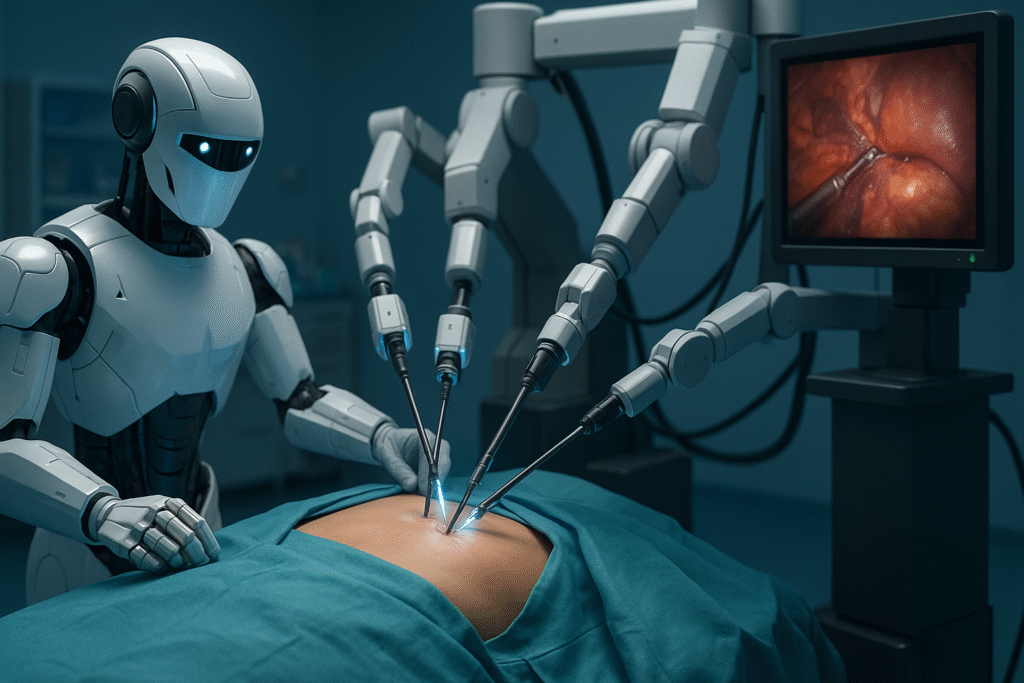In a momentous step for surgical science, an AI powered robotic gallbladder surgery was recently performed with 100% success, leaving experts stunned and hopeful. The surgery, conducted entirely by an autonomous robotic system trained through deep learning algorithms, showcased not only the technological advancement of AI but also its life saving potential in modern medicine.
This medical milestone reflects a paradigm shift where robotic precision meets human care promising faster recovery, minimal complications, and scalable surgical solutions for the masses.
First Fully Autonomous Robotic Gallbladder Surgery
The groundbreaking surgery took place at a private hospital in Munich, Germany. The patient, Claudia M., 52, had suffered from gallstones and recurring biliary pain for over a year. Due to her complex medical background, traditional surgery posed heightened risks. After several consultations, her doctors suggested participation in an experimental robotic gallbladder surgery trial led by a German Swiss medical tech collaboration.
Key Features of the Surgery:
AI Decision Making: The robot evaluated Claudia’s scans, adjusted for minor anatomical anomalies, and executed decisions during the procedure.
Real Time Adaptability: The system responded dynamically to tissue density and subtle shifts in organ positioning.
Precision Metrics: Blood loss was negligible, incision size was 45% smaller than traditional methods, and total procedure time was 39 minutes. Claudia was walking within hours and discharged the next day with no postoperative pain or complications.
Why Surgeons Are Embracing AI
Dr. Maximilian Ritter, lead surgeon and AI integrated surgery researcher, stated, “This robotic gallbladder surgery marks a turning point in how we approach internal operations. The AI’s micro decisions, based on millions of past data points, surpass what a single surgeon can process in real time.”
Dr. Anjali Kohli, an AI ethics advisor in healthcare, emphasized, “AI in surgery doesn’t remove human care it enhances it. Surgeons become supervisors while the robot does the work without fatigue, error, or bias.”
The global surgical community is paying close attention, with Johns Hopkins and the University of Tokyo already planning trials for similar AI driven procedures.
Technology Behind the Surgery: What Makes It Work?
The AI system, codenamed SurgiMind, was trained on 2.4 million surgical datasets including imaging, motion paths, complication handling, and tissue response feedback.
Computer Vision for real time anatomical tracking, Predictive Analytics to anticipate tissue movement, Autonomous Robotic Arms with micro surgical tools, Haptic Feedback Sensors to monitor pressure and avoid damage. This was not just a robotic assistant it was a self sufficient surgical intelligence system, pushing the limits of robotic gallbladder surgery.
Patient’s Perspective: “I Trusted the Machine with My Life”
“When they told me a robot would be doing the entire surgery, I was scared. But after learning how accurate it was and how much data it was trained on, I said yes. Today, I feel like I was operated on by something from the future. No pain, no fear, just healing.”
Her story has since inspired others to sign up for upcoming AI surgery trials, especially patients considered high risk for traditional procedures.
Benefits of Robotic Gallbladder Surgery
Let’s break down why robotic gallbladder surgery is being hailed as revolutionary, Factor Traditional Surgery Robotic Gallbladder Surgery, Precision Surgeon dependent AI enhanced micrometer precision, Recovery Time 5–7 days 2–3 days, Error Margin Human risk present Reduced to near zero. Scalability Surgeon availability Deployable 24/7, globally.
Additionally! such technology can serve developing countries with limited access to highly trained surgeons, offering safe surgeries via AI operated mobile clinics in the future.
Challenges and Ethical Considerations
While the success of robotic gallbladder surgery is exciting, some concerns remain, Who’s accountable if something goes wrong? Can AI truly replicate human intuition in emergencies? What happens to surgical jobs in the next 10 years?
Experts argue that robotic gallbladder surgery should be viewed as augmentation, not replacement. Surgeons will evolve into strategists, monitoring and refining robotic performance while still being vital in patient care and decision making.
A Glimpse into the Future of Healing
The world just witnessed the future robotic gallbladder surgery with 100% success and no complications. It’s a testament to how artificial intelligence can profoundly elevate the standards of healthcare.
With AI removing human error and enabling surgical access in even the remotest corners of the world, the horizon for global health equity has never looked more promising. It’s not science fiction anymore it’s happening now. As Claudia says, “The robot didn’t just remove my gallbladder it gave me a second chance.”

